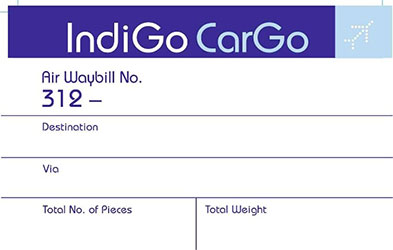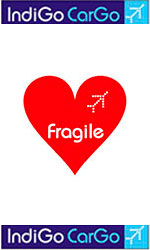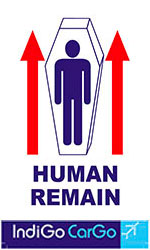General CarGo – Hassle free handling
Send documents, samples, consolidations, readymade garments, auto parts, machine parts, fabrics, personal effects, household goods, footwear, carpets, etc. anywhere with our efficient and simple general cargo services.
Terms and conditions:
Cargo: Equivalent to the term “goods” mean, anything carried or to be carried in an aircraft, other than mail and baggage (including personal effects accompanying passengers) or the property of the carrier. Unaccompanied baggage moving under an air waybill is cargo.
General carGo is a generic term used for those shipment which do not requires special handling. It includes documents and samples (courier bags), motor parts, readymade garments, fabrics etc.
Acceptable nature of Cargo
The shipper is obligated to comply with all customs regulations and all other government regulations related to the packing, carriage and furnishing of such information, and completion of all necessary documentation. However, IndiGo is under no obligation to inquire into the correctness of required information.
A shipment can only be accepted if nature of goods is acceptable for air transportation
At the time of accepting shipment, local restrictions to the destination’s provincial authority (if applicable) must always be adhered to and the same to be informed to the shipper/agent.
Airworthy packaging of Goods
IndiGo ensures that any package or overpack is inspected and is not accepted, unless:
The shipper is responsible to ensure that the cargo is packed in an appropriate way for air-carriage, that it can be carried safely without causing any injury/ damage to any person, goods or property.
Documents at the time of acceptance
The following documents are required at the time of booking cargo:
The shipper or his agent is required to furnish the above details for tendering load to IndiGo.
Markings and labels
Labels must be fully visible, and all old labels and markings must be obliterated/ removed. A fresh CarGo label/sticker should be used on all packages. Labels must contain the following mandatory information in addition to which additional optional information can be added:
All the required labels are available on all the cargo counters of IndiGo.
Types of labels
1. Marking labels
These labels are affixed or tagged along with the package to give them an identity. The below figure shows the basic marking labels used in IndiGo.

2. Handling labels
These type of labels, when affixed or tagged on the packages explains how that package needs to be handled. Below are samples of some of the handling labels.



List of Prohibited Articles
The following are the list of Prohibited items which cannot be carried on IndiGo flight. The same is also printed at the back of the Instruction for Dispatch of Goods (IDG).
Acetyl, Benzoyl peroxide solid or solutions, Aerolein uninhibited, Aerosol Products, class 8 poison n.o.s., Air liquid non-pressurised Aluminium diethyl Monochloride, Aluminium dross, wet Arsine Black powder, Bombs, explosive Caps Blasting, chloropicrin and methyl chloride mixtures, Chloropicrin and methyl chloride mixtures, Cigarettes self-lighting, Disopropyl-benzene hydroperoxide solution, Ethyl acrylate uninhibited, Explosive or explosive devices new, Fire extinguisher, charges, Fuzes, detonating Grenade, hand of rifle with bursting charge, Grenades, Tear Gas, Hydrogen liquid, Hydrogen sulphide, isopropyl percarbonate stabilised, isopropyl percarbonate unstabilised, Low explosive, Mines explosive, Nickel carbonyl Nitric oxide spent
List of Restricted Articles
The following are the List of restricted Articles which are not carried on IndiGo flight. This list also appears at the back of the IDG:
Acetal, Acetone, Ammonium fluoride, Argon gaseous, Arsenic acid, solid Barium chlorate Benzene, Borneol calcium chlorate, carbon dioxide gaseous or liquefied, Charcoal activated, chloroform, copper cyanide oil, DISCETYL diethylamine, Ether Ferric chloride, Formic acid, Fuel aviation turbine engine, Helium gaseous, Hydrochloric and mixtures lead nitrate matches, Safety (book card or strike-box), malathion, perfumes, methanol, nitrogen gaseous and Silver nitrate.
THIS LIST OF PROHIBITED/RESTRICTED ARTICLES MENTIONED ABOVE IS NOT EXHAUSTIVE AND is issued mainly for the guidance of the consignors. An exhaustive list may be seen in the "IATA DANGEROUS GOODS REGULATION" which is available at all our CarGo booking offices. Carriage of restricted articles, their packing certificate etc. shall be in accordance with the current edition of IATA Dangerous Goods Regulations
Shipper’s Right of Disposition (for Domestic shipment)
The shipper has the right to dispose of off its goods as follows:
a. Shipper may withdraw the goods at the airport of departure or destination.
b. Shipper may stop them in the course of the journey at any schedule landing point.
c. Shipper may call for goods to be delivered at the place of destination or in the course of the journey to a person other than the consignment named on the face of the Air Waybill.
d. Shipper may require goods to be returned to the airport of departure.
e. Shipper must not exercise this right of disposition in such a way as to prejudice a carrier or other consignors.
f. The shipper shall reimburse the carrier for any expenses occasioned by the exercise of his right of disposition.
g. The shipper can take delivery at the transit station.
h. The agent can act on behalf of the shipper, but the authorisation letter from the shipper is necessary before commencing the procedure. The Agent needs to submit the written authorisation from the shipper (can be in the form of a letter or email) to the IndiGo counter before exercising the right of disposition on shipper’s behalf. E-Mail, if used as a means of communication, should be sent on the IndiGo’s station id only.